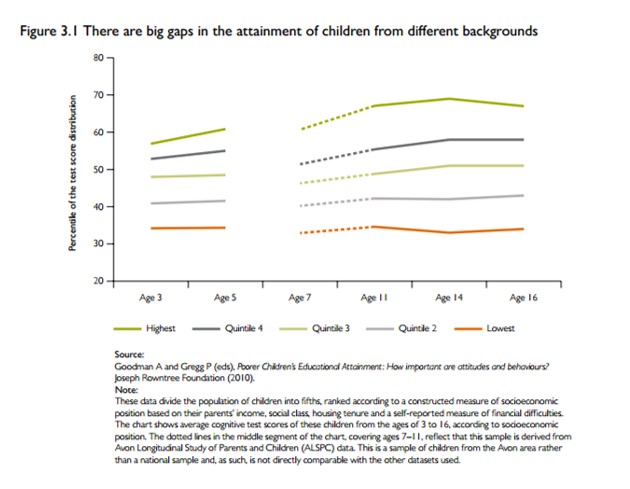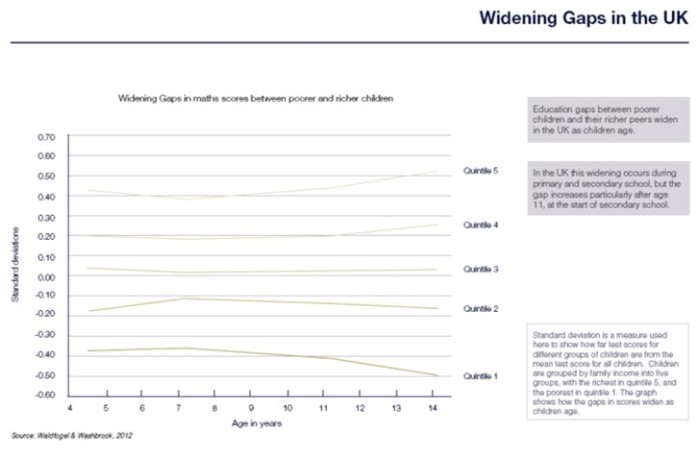The image below shows that family income has a significant impact on test scores at the age of 3, and that the differences between kids from different income bands increases as they progress through school. It is an illustration of a depressing yet familiar story.

Less familiar are those moments when we see this achievement gap play out in the life of an actual kid. On a school visit I recently spoke to a girl in Y11; she qualifies for the pupil premium. This girl took two GCSEs in Year 10 and gained an A in French and an A* in RE. She is predicted mostly A’s in her other subjects this year. When I asked her of her plans for next year (her school has no sixth form), she replied – “I’ll probably go to the local college to do BTECs.”
On the website of every school in England you’ll see a report on how it spends its Pupil Premium grant – it’s a statutory requirement. Last year a DFE study revealed that schools spend this grant (almost £1000 per student per year for secondary schools, more for primary schools) on 18 different interventions, on average. The most popular interventions include paired or small group additional teaching; 1:1 tuition; trips to culture venues; social/emotional support programmes and extra-curricular clubs e.g. breakfast/homework.
Aside from the fact that an average of 18 different interventions indicates a lack of clarity about the specific barriers facing disadvantaged kids in our schools, I wonder if thinking about pupil premium as a collection of different interventions might suit our budgeting and reporting requirements, but not the actual journey that an actual disadvantaged student takes through our school – a journey beset by potential pitfalls and obstacles.
Perhaps we could rethink our approach to Pupil Premium by identifying critical moments when these students are vulnerable; moments when social mobility gets stuck. The diagram below, for example, suggests that the gap between richer and poorer kids widens at the start of secondary school:

These moments when social mobility gets stuck might also include:
- Primary > Secondary transition
- If/when attendance slips below 95%
- If/when a student reaches a behaviour threshold e.g. 5 incidents in a half term or similar
- Y9 options
- Start of Y11
- Post-16 options
- UCAS process
- A level results day
The moments above can be challenging for all students, not just Pupil Premium students, but it’s at critical junctures such as these that more affluent kids receive additional support from their families. The sociologist Robert Putnam talks about airbags inflating in the lives of richer kids at the first sign of trouble:
When a kid from an affluent home does a dumb thing, like getting involved with drugs, airbags instantly inflate to protect the kid form the bad consequences of that dumb decision. So if one of my grandchildren got involved in drugs the first thing I would do is find the best lawyer in town and the second thing I would do is find the best rehab facility in town… and I’m not apologising for that. That’s what parents and grandparents do, they try to help kids get around the results of bad decisions. But if one of the poor kids in our book does exactly the thing that I’ve just described: no airbags – and that encapsulates the degree to which we’ve shunted these kids from the rest of society. (quotation taken from this podcast interview)
With no airbags to cushion the crash, our Pupil Premium kids can easily succumb to teenage trials and tribulations. So perhaps we could improve our Pupil Premium provision by basing our support not around different pockets of spending, but around the critical points in the journey of kids through our care. Going back to our list of sticky moments in social mobility, here’s what our support might look like:
- Primary > Secondary transition: Member of staff from secondary school makes a home visit and then checks in with the student every day for first week of secondary school, then once a week thereafter.
- If/when attendance slips below 95%: Parent/teacher meeting
- If/when a student reaches a behaviour threshold e.g. 5 incidents in a half term or similar: Tailored support to address cause of behaviour issues
- Y9 options: Guidance on appropriate courses from specialist careers coach
- Start of Y11: Provision of all revision guides and revision audit e.g. do they have access to a quiet space? Do they know how to revise? Do they know how to access past papers?
- Post-16 options: Guidance on appropriate courses from specialist careers coach
- UCAS process: As above, plus fully subsidised visits to appropriate universities and interview prep if required
- A level results day: Priority support at 7am on results day as clearing lines open
Our poorer kids don’t always benefit from the seatbelts and airbags that keep more privileged kids on the straight and narrow. It’s for those of us in schools to identify moments of vulnerability for our most disadvantaged kids in order to stop the achievement gap playing out before our eyes.
Images above from these reports: